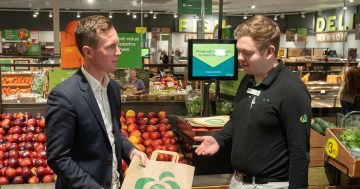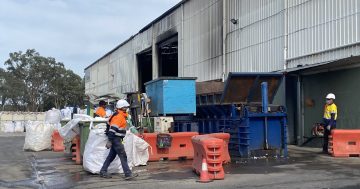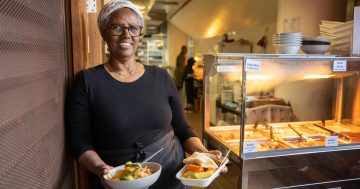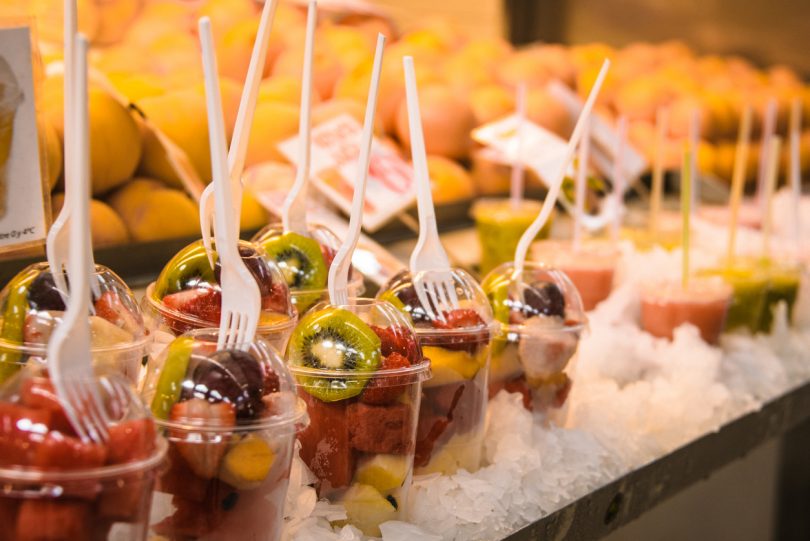
The days of single-use plastic cutlery and cups are numbered but progress is slow. Photo: File.
In the face of a pandemic-induced economic slowdown, the ACT Government has delayed its nation-leading legislation to phase out single-use plastics to give business a break.
One Canberra enterprise, however, thinks that approach is rubbish.
Packaging and hospitality wholesaler Pac Le Mond specialises in eco-friendly products, such as compostable cups, bags and containers, and owner Paul Dennison would like to see the end of single-use plastics sooner rather than later.
Since taking over the Hume business more than a year ago, Mr Dennison has rebranded and repositioned the firm as an environmentally friendly supplier, although he still sells some plastic and foam products due to continued demand.
He is trying to steer his customers away from these products but the cost factor remains a barrier for some, particularly as it can be double the price of plastic.
”Having said that, more and more are going down that [eco-friendly] path,” he says.
Mr Denision says people want environmentally friendly products.
”In fact, some of our customers are saying some of their customers won’t even buy from them if they’re not providing the product in an environmentally-friendly container,” he says.
One customer is the vegan Sweet Bones cafe in Braddon, where the compostable and recyclable products fit with its ethos.
”Definitely, from the get-go, that’s what we wanted to do,” says owner Russell Brindley, who can’t see why the government would delay its phase-out, although he understands it could be a strain on some businesses.
While the government’s reluctant to make life even harder for businesses during the pandemic, the lack of legislation and delays are holding back other business and manufacturing opportunities, as well as contributing to the worsening pollution in landfills, waterways and the ocean.
For people like Mr Dennison, there is an obvious business motive for banning non-compostable products, but he notes that good intentions are not enough to make the kind of inroads needed to address the plastic problem.
”There is strong support for it and, if it were mandated, our customers would be able to say ‘I’m sorry we can’t sell you any of these products any more'”, he says.
But there is devil in the detail as some products may be marketed as compostable or recyclable only to fall short when you read the fine print.
With some it is just ‘greenwashing’, but others require commercial composting or recycling operations to be safely taken out of the waste stream.
“It’s a bit of a misconception that products can go in the recycling bin and it’ll be okay,” Mr Dennison says.
But again there needs to be top-down action with governments leading the way, providing subsidies or grants to encourage commercial facilities to be set up, he says. Something one of Pac Le Mond’s suppliers, national firm Biopak, has been advocating at government levels.
It wants nationwide bans of single-use plastics in the food industry and the building of local composting and recycling infrastructure to deal with waste that is currently going to landfill.
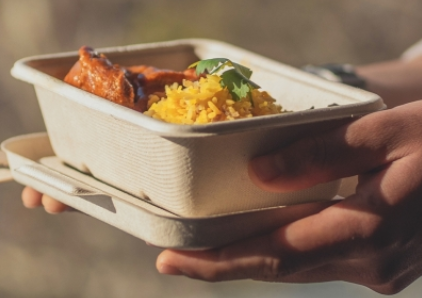
The good takeaway: BioPak’s compostable container. Photo: BioPak.
But founder and sustainability director of BioPak Richard Fine is wary of big recycling plants that need to import dubious feedstock across state borders.
”It’s far more economical to build infrastructure that can capture and recycle organic waste than building massive recycling plants when you have to ship product interstate, and then is that end material used to make packaging again or is it down-cycled?” he says.
BioPak has even established its own national network of composters to process its products, although not in the ACT.
The pandemic has had mixed effects for the hospitality industry. BioPak has seen greater demand for takeaway products but trade dried up in the events and sports sectors.
Some cafes and restaurants are reporting delays in receiving stock, but BioPak was prescient enough to ensure supplies in anticipation of a spike in demand
But the pandemic has also seen a resurgence in the single-use plastic-lined coffee cups and plastic containers.
Down on the South Coast, 24 businesses have been named champions in the Eurobodalla Shire Council’s We Care Eurobodalla program for removing all five problem plastics: plastic-lined coffee cups or milkshake cups, plastic bags, single-use straws, plastic cutlery and plastic takeaway containers.
The program, funded by the NSW Environmental Trust, helps local businesses find environmentally sustainable products, connect them with local suppliers and offers trial packs to test available products.
Brendan Rosser from The Venetian cafe in Batemans Bay says the business tries to stay away from single-use plastics as much as possible, and while the cost is passed on to customers they don’t seem to mind.
He says they appreciate the effort and the business benefits from that goodwill.
”Where products are available to source we’ll always go with that option,” Mr Rosser says.
The ACT Government’s two-stage phase-out legislation is likely to reappear next year and a Food Organics Garden Organics (FOGO) and composting facility service is not expected until 2023.












